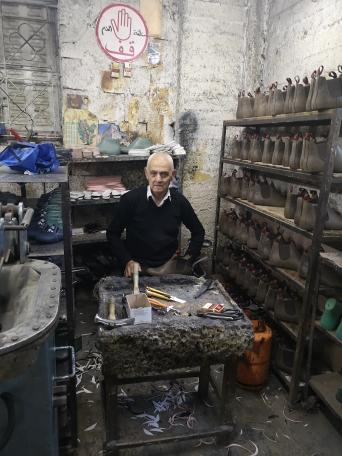I met Hassan Abu Rmaileh when my CPT teammate and I escaped the overwhelming tear gas near Saleymeh Checkpoint. He heard us scrambling down the alley where he lives and ushered us into his shoe factory at the back of the building. There we received true Palestinian hospitality—respite, coffee, and the chance to talk. I visited again later to say thank you and hear more.
Hassan and his four brothers, with their families, all live in the big building above the factory which they run together. One is a lawyer but can’t find legal work. Hebron is famous for its shoes and the family sells to locations in Nablus and Jenin, as well as exports to Dubai and other international locations.
When Hassan’s father Abu Ashraf opened the factory some fifty years ago, the area was safe, and it was a five or ten-minute walk to the city centre. Since the Israeli military closed Shuhada Street in 1994, it takes 30-40 minutes. And, when a small military post 100 metres away became the Salaymeh Checkpoint ten years ago, family members now have to go through ID checks, body searches, or metal detection, and sometimes are not allowed to pass through to the Old Town.

Hassan’s brother showed me shocking footage on his mobile of a young Palestinian man, immobilized by tear gas outside the factory, being shot dead at close range by soldiers from the checkpoint who then dragged his body away by his hands and feet. This happened five years ago. He said that they were all scared to put anything in their pockets in case the soldiers shot at them, claiming they were carrying a gun.
Hassan has serious fears for his children. There are regular incidents at school time when the soldiers respond to children who throw one or two stones in the direction of the checkpoint with multiple tear gas grenades. His children’s health suffers. He’s especially worried about his newborn son, who had breathing difficulties after inhaling tear gas at three days old and is still, a month later, not breathing well and receiving medical care. “I always wake to the smell of tear gas,” he says, adding that he has to call to the children each morning to close all the windows. Abu Ashraf also has health problems related to breathing in tear gas, in his case with his heart.
On the morning of my second visit, Hassan had gone out to ask the schoolkids to stop messing about and remember there was a baby in the house, and in return became the target of both stones and tear gas.
His hopes for the future? “Good health and good memories,” he said. He wants his kids to stand by each other and look after the factory. Looking at me, he added, “Tell the people the real story.”
His father tells me, as we prepare to leave, “We need people to stand with the Palestinians. We need you to take photos and to tell the stories.”




